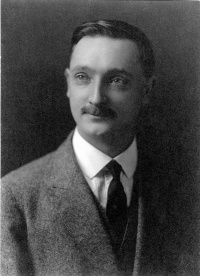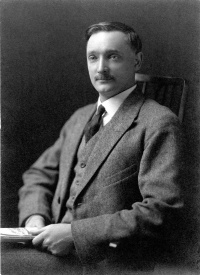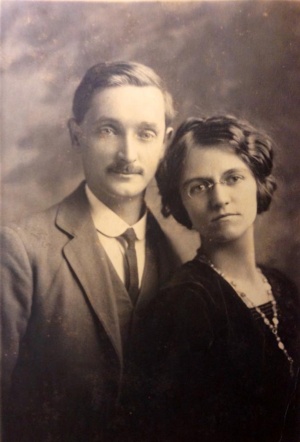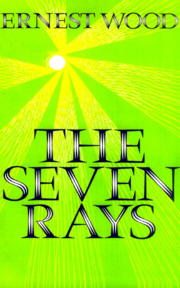Ernest Wood: Difference between revisions
| Line 23: | Line 23: | ||
He was highly in demand as a lecturer around the world. In 1924, he had the honor of presenting the [[Blavatsky Lectures|Blavatsky Lecture]] on the topic '''[http://resources.theosophical.org/pdf/BL_1924_Wood_Personal_Psychology_and_the_SubConscious_Mind.pdf "Personal Psychology and the Sub-conscious Mind"].''' | He was highly in demand as a lecturer around the world. In 1924, he had the honor of presenting the [[Blavatsky Lectures|Blavatsky Lecture]] on the topic '''[http://resources.theosophical.org/pdf/BL_1924_Wood_Personal_Psychology_and_the_SubConscious_Mind.pdf "Personal Psychology and the Sub-conscious Mind"].''' | ||
He served as the Recording Secretary of the Theosophical Society; the Principle of the Sind National College, Hyderabad; Honorary Secretary of the Theosophical Educational Trust; President of Manchester | He served as the Recording Secretary of the Theosophical Society; the Principle of the Sind National College, Hyderabad; Honorary Secretary of the Theosophical Educational Trust; President of Manchester City Lodge in England; and President of the Blavatsky Lodge in Sydney. | ||
Wood acted as secretary to [[Charles Webster Leadbeater]] for several years, and assisted him in writing [[Lives of Alcyone (book)|''Lives of Alcyone'']] and ''Clairvoyant Investigations''. Leadbeater would investigate some question clairvoyantly, while Wood recorded his words in shorthand. | Wood acted as secretary to [[Charles Webster Leadbeater]] for several years, and assisted him in writing [[Lives of Alcyone (book)|''Lives of Alcyone'']] and ''Clairvoyant Investigations''. Leadbeater would investigate some question clairvoyantly, while Wood recorded his words in shorthand. | ||
Revision as of 20:04, 19 November 2024
ARTICLE UNDER CONSTRUCTION
ARTICLE UNDER CONSTRUCTION
Ernest Wood was an English educator, writer, lecturer, and Sanskrit scholar who was active in the Theosophical Society based in Adyar, Chennai, India.
Personal life
Ernest Egerton Wood was born on ... in ...England.
Work as educator
Dr. Wood was very active in the Society for the Promotion of National Education that was established in 1916 by Annie Besant and others.
Theosophical Society involvement
Ernest Wood was admitted to the Theosophical Society in Manchester, England on March 30, 1903 and rejoined in 1909.[1]
He was highly in demand as a lecturer around the world. In 1924, he had the honor of presenting the Blavatsky Lecture on the topic "Personal Psychology and the Sub-conscious Mind".
He served as the Recording Secretary of the Theosophical Society; the Principle of the Sind National College, Hyderabad; Honorary Secretary of the Theosophical Educational Trust; President of Manchester City Lodge in England; and President of the Blavatsky Lodge in Sydney.
Wood acted as secretary to Charles Webster Leadbeater for several years, and assisted him in writing Lives of Alcyone and Clairvoyant Investigations. Leadbeater would investigate some question clairvoyantly, while Wood recorded his words in shorthand.
Lecture tours
Other experiences
While traveling on the ship Conte Rosso from Bombay to Venice, Wood met with the Indian spiritual master Meher Baba.
Baba's trip was widely publicized this time and many on board were anxious to meet him. A few persons knew about him, though Baba saw almost no one. He met only Professor Ernest Wood, a Theosophist working at the Theosophical Society in Madras, to whom Baba explained what he meant by spirituality at length.[2]
Later years
In 1962, Dr. Wood helped to establish a Montessori school in Houston, Texas, the School of the Woods:
Some people understandably think the school was named for the sylvan setting of its campus. Its name, however, honors Ernest and Hilda Wood, who inspired and guided its founding along Montessori principles. Dr. Wood, a Sanskrit and Asian scholar, introduced the Montessori philosophy to the study group who were considering establishing a new nursery school. When the school opened, he was president of the first board of trustees.[3]
The school has been operating continuously since 1962, and now has classes from preschool through high school.
From 1959-1965, the Woods published Ernest Wood's Question and Answer Bulletin, a newsletter that was very popular study material for American Theosophical lodges.
Ernest Wood died on September 17, 1965 at the age of 83 of cancer and pneumonia. He left his body to medical research at Baylor College of Medicine.[4]
Writings
Mr. Wood was a prolific writer, and authored many articles that were printed in at least 18 different Theosophical periodicals. The Union Index of Theosophical Periodicals lists 253 articles by or about Ernest Wood.
He also wrote numerous books, pamphlets, and courses on Theosophy, yoga, psychology, education, and other subjects. His most popular works were Yoga and The Seven Rays. Many books were reprinted in other editions and languages, including French, Spanish, German, Slovenian, Thai, Chinese, Swedish, Italian, Polish, Hebrew, Japanese, and Icelandic.
Autobiography
- Is This Theosophy? London: Rider & Co, 1936. 318 pages. Available at Internet Archive.
Books on Theosophy
- Clairvoyant investigations by C. W. Leadbeater, and "The lives of Alcyone" (J. Krishnamurti). Madras, India, 1947. Pamphlet. 39 pages. "some facts described by Ernest Wood ; with notes by C. Jinarajadasa."
- Come Unto Me and Other Writings. Adyar, Chennai, India: Theosophical Publishing House, 2000. First edition.
- Destiny. Chicago: Theosophical Press, 1923. "Reports of five lectures which I gave during a tour in America in the autumn of 1921"--Foreword.
- Free Will and Determinism. Adyar, Madras: Theosophist Office, 1909. Pamphlet. 24 pages.
- The Future of the Theosophical Society: being the five convention lectures delivered in Benares at the fifty-fifth anniversary of the Theosophical Society, December, 1930. Adyar, Madras, India : Theosophical Pub. House, 1931. Other lecturers: Annie Besant, Hirendranath Datta, B. Sanjiva Rao, and C. Jinarajadasa.
- A Guide to Theosophy. Adyar, Madras, India; London: Theosophical Publishing House, 1924. 95 pages.
- The Intuition of the Will. Chicago: Theosophical Press, 1927.
- Natural Theosophy. Madras, India: Ganesh & Co, 1930. 245 pages. New edition Adyar, Madras, India: Theosophical Publishing House, 2008. 158 pages.
- The New Theosophy. Wheaton, Ill.: The Theosophical Press, 1929.
- Personal Psychology and the Sub-Conscious Mind. Adyar, Madras, India: Theosophical Publishing House, 1924. Blavatsky Lecture, 1924 issued as a pamphlet. 27 pages.
- Questions on Occultism. Wheaton, Ill.: Theosophical Publishing House, 1978. Edited by Kwaku Adzei from issues of Ernest Wood's Question and Answer Bulletin from 1959-1965.
- The Science of Brotherhood. Adyar, Madras, India: Theosophical Publishing House, 1931.
- A "Secret Doctrine" Digest; the laws and facts of nature and life as taught by H. P. Blavatsky in her monumental work the Secret Doctrine, with explanations where necessary by Ernest Wood. Adyar, Madras, India: Theosophical Publishing House, 1956. 480 pages.
- The Seven Rays: a Theosophical Handbook. Chicago: Theosophical Press, 1925. Available at HathiTrust. Wheaton, Ill : Theosophical Pub. House, 1976.
- Tanjore District Theosophical Lectures: Six Lectures. Adyar, Madras, India: The Theosophist Office and London: Theosophical Pub. Society, 1909.
Books on Yoga
- The Four Hatha Yogas and Practical Concentration and Meditation. Kessinger reprint; possibly a compilation.
- Great Systems of Yoga. New York: Philosophical Library, 1954. Available as HTML at sacred-texts.com.
- The Occult Training of the Hindus. 1931. Madras, India: Ganesh & Co., 1931. 153 pages.
- The Occultism and Spiritualism of the Hindus: practical guidance on raja yoga, hath yoga, concentration, meditation and 'spiritualism' - the science of contacting the spirits of the other world. Delhi: Indian Publishers' Distributors, 1999. "This compilation consists of two parts: Part I: Hindu occultism - This contains the revised version of...The occult training of the Hindus (1931). Part II: Hindu spiritualism - the science of contacting the spirits - This contains a hither to unpublished over fifty years old manuscript 'A complete, guidance on Hindu spiritual culture' of the erstwhile Spiritual Healing Centre, Coimbatore."--preface.
- Seven Schools of Yoga: An Introduction. Wheaton, Ill.: Quest Books, 1965, 1973. Available to borrow at Internet Archive. Originally published in 1931 under title The Occult Training of the Hindus."
- Raja Yoga: The Occult Training of the Hindus. Adyar, Madras, India: Theosophical Publishing House, 1927.
- Yoga. New York: Philosophical Library, 1956. 178 pages. Reprinted Baltimore, Md.: Penguin Books, 1959. Available to borrow at Internet Archive.
- Yoga Dictionary. New York: Philosophical Library, 1956.
- Yoga Wisdom. New York: Philosophical Library, 1970. 101 pages.
Books on other religious topics
- The Heaven of the Hindus. Madras: Vasanta Press, 1909.
- An Introduction to the Science of Prayer. Sydney: St. Alban Press, 1969. Pamphlet. 40 pages.
- The Science of Prayer. Sydney, Australia: St. Alban Press, 1925
- Vedanta Dictionary. New York: Philosophical Library, 1964. 225 pages.
- Zen Dictionary. New York: Philosophical Library, 1962. 165 pages. Available to borrow at Internet Archive.
Books on India
- An Englishman Defends Mother India, a complete constructive replay to "Mother India". Madras, Ganesh & Co., 1928. 458 pages.
- Text Book of Indian Citizenship. Vol. I. Madras, India: Ganesh & Co., 1920. Available at HathiTrust.
- Selected Articles on National Education. Hyderabad, Sind [India]: The Sind Publishing Trust, 1917.
Books on self-help
- The Building of Character. Adyar, Madras, India: Theosophical Publishing House, 1932. Adyar Pamphlet No. 114. Pamphlet. 24 pages. Available as HTML at Universal Co-masonry.
- Character Building: a Practical Course. Chicago: Theosophical Press, 1924.
- Concentration: An Approach to Meditation. Wheaton, Ill.: Quest Books, 1968, 1985. Available to borrow at Internet Archive and through Hoopla. "This perennial best-seller by a distinguished educator assembles 36 mental and physical exercises for taming the natural drifting of the mind."
- Concentration: a Practical Course. Chicago: Theosophical Press, 1923. Available at Internet Archive.
- Memory Training: a Practical Course. Theosophical Publishing House, 1915. Available at Hathitrust and Internet Archive.
- Mind and Memory Training. Chicago, The Theosophical Press, 1900? 95 pages. Second edition, revised in London: Sir I. Pitman & Sons, Ltd., 1936, 1947. Reprinted Adyar: Theosophical Publishing House, 1974.
- A Study of Pleasure and Pain. Wheaton, Ill.: Theosophical Pub. House, 1962, 1972. Available to borrow at Internet Archive. 97 pages.
- Taking Charge of Your Life. Wheaton, Ill.: Theosophical Pub. House, 1985. 129 pages. "Originally published under the title: Character building."
Sanskrit translations
- The Bhagavad Gita Explained, with a literal translation from the original Sanskrit. Los Angeles: New Century Book Shop, 1954. San Francisco, Calif., The American Academy of Asian Studies Graduate School, 1961. 232 p.
- The Garuda Purana. Allahabad: Pāṇiṇi Office, 1911. Translation with Subrahmanyam. Available as HTML with commentary at sacred-texts.com. Available at Internet Archive. Original edition issued as v. 9 of the Sacred books of the Hindus. "An adaptation and abridgement of the Garuḍapurāṇa, 'done for the helping of those who cannot understand the difficult earlier works.'"
- New York: AMS Press, 1974. Introduction by Sris Chandra Vasu. "An adaptation and abridgement of the Garuḍapurāṇa, 'done for the helping of those who cannot understand the difficult earlier works.'" Available at HathiTrust.
- The Glorious Presence; a study of the Vedanta philosophy and its relations to modern thought. Including a new translation of Shankara's Ode to the south-facing form.. New York: Dutton, 1951. London; New York: Rider, 1952. Translation of Śaṅkarācārya. Available at Internet Archive.
- The Pinnacle of Indian Thought: being a new, independent translation of the Viveka Chūdāmani (Crest jewel of discrimination) with commentaries. Wheaton, Ill.: Theosophical Publishing House, 1967.
- Practical Yoga, Ancient and Modern: Being a New, Independent Translation of Patanjali's Aphorisms. London: Rider & Co., 1931. Hollywood, CA: Wilshire Book Co., 1948, 1966. E. P. Dutton, 1948. Bombay: D.B. Taraporevala, 1954.
- The Song of Praise to the Dancing Shiva. Madras, India: Ganesh & Co., 1931. Translation of the Śivatāṇḍavastotra; with explanation and stories. Sanskrit text and English translation on opposite pages.
Periodicals
Ernest Wood's Question and Answer Bulletin was a newsletter published from 1959-1965. It was used as a basis for discussion in many lodges of the Theosophical Society in America.
Honors and awards
In 1924, Dr. Wood was awarded the Subba Row Medal for his contributions to Theosophical literature, and especially for writing Intention of the Will.
The School of the Woods in Houston, Texas is named after Ernest and Hilda Wood.
Additional resources
Articles
- Wood, Ernest at Theosophy World
- School of the Woods in Wikipedia.
Websites
- School of the Woods.
- Meher Baba Travels website offers a brief biography of Wood and details of his meeting with Meher Baba.
Video
- Wisdom From Masters, Ernest Wood This is Day 10 Season 5 of 41-Day Meditation Sessions. Posted on Meditation Coach Ayyappa Pindi YouTube channel on September 29, 2020. Meditation instruction based on Ernest Wood's books.
Notes
- ↑ Theosophical Society General Membership Register, 1875-1942 at http://tsmembers.org/. See book 1, entry 23326 (website file: 2C/1).
- ↑ Meher Baba's Life and Travels: S. S. Conte Rosso.
- ↑ "A Brief History of School of the Woods (Established 1962)", School of the Woods web page.
- ↑ Texas, U.S., Death Certificates, 1903-1982. Certificate of Death no. 55723.



